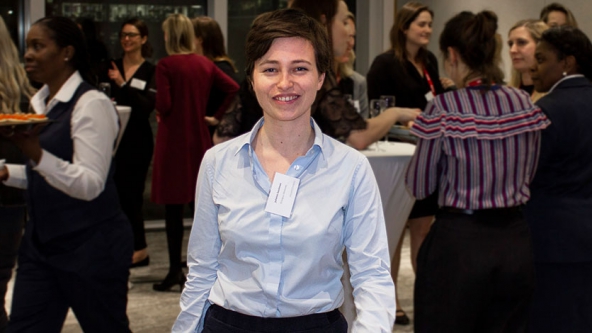The UK may be one of the best places in the world to launch a start-up, but female-led businesses are still significantly underrepresented. This is not only bad for gender equality, it’s also bad news for the UK economy.
In 2017, UK start-ups raised an estimated £10 billion from investors willing to provide investment capital to help fund their growth. That’s twice as much funding as was gained in 2016. However, fewer than one in ten of these start-ups (companies with revenues of £1 million to £250 million) had at least one female founder. It’s still clearly a very male-dominated ecosystem.
We already know that gender differences – namely education, experience, networks and access to capital – all have a significant impact on the ways in which men and women approach and practice entrepreneurship.
But any bias against female entrepreneurs – unconscious or otherwise – risks becoming a major block on growth in general. That’s why last year, Octopus sponsored the Women in Leadership report in partnership with the All-Party Parliamentary Group (APPG) for Entrepreneurship. This is a cross-party group of MPs that looks to encourage, support and promote entrepreneurship in the UK.
Shining the spotlight on a critical issue
The report surveyed more than 500 UK-based entrepreneurs, encouraging them to view their opinions on a number of topics, ranging from tackling gender stereotypes to securing business investment. The answers uncovered some startling realities.
For example, despite the recent surge towards entrepreneurship, women are still playing catch-up. While 11.5% of the male adult population is currently engaged in entrepreneurial activity, the number falls to 5.3% of women. With fewer women taking the plunge and starting their own business, the survival rate of women-led businesses stays at a low level too.
Businesses started by women often have fewer options when it comes to supporting their business financially. The survey found that just 16% of female-led companies secured external funding between 2009 and 2017. This matters hugely. As the report notes, companies that secure funding scale up to 81% faster, because investment gives them the opportunity to find bigger premises or take on more employees.
Overall, the opportunity cost of ignoring women founders is enormous. The APPG report estimates that if the UK were to boost the number of female-led businesses to match the number of those led by men, it could add more than £180 billion gross value to the economy by 2025.
What’s behind the gender funding gap?
One potential factor could be a lack of female representation within the venture capital (VC) industry. The report found that in Britain, women make up just 14% of business angels, and globally only 7% of partners at the top 100 VC firms are female.
This shortfall is problematic, because female VC partners are twice as likely to invest in companies with a woman on the management team, and three times more likely if there’s a female CEO.
Zoe Chambers is an early stage investor at Octopus Ventures, one of Europe’s largest VC firms with more than £1 billion invested in entrepreneurs and founder-led businesses.
Zoe’s team – currently made up of three women and one man – funds all sorts of start-ups within tech-heavy sectors such as intelligent robotics, artificial intelligence and advanced materials, among others – what Octopus Ventures classifies as the Future of Industry.
And in the past three years, one in three of the businesses Octopus Ventures has funded has been led by a woman.
“In the past, venture capital has been a very male domain,” Zoe says. “Having female angel investors and venture capitalists on the other side of the table is critical to ensuring female founders don’t miss out on early-stage investment.”
Challenging gender stereotypes
Another potential factor behind the funding gap could be the kinds of businesses women tend to start. The report found that the bulk of women-led businesses are in retail and wholesale, education, human health, arts and entertainment, and other service sectors.
Zoe explains, “It often comes down to what’s called founder-market fit. Some women’s skills and interests are suited to setting up businesses in beauty, fashion or childcare – but it’s worth bearing in mind that these can be swiftly judged (rightly or wrongly) as ‘lifestyle’ businesses that generally scale at slower rates.”
Expectations of slower growth are unfair
Start-ups considered less likely to scale quickly are often less attractive investment opportunities for VC firms seeking ‘explosive’ growth. Zoe continues, “But it’s a gross misconception that this is all that women can do. Some of the most exciting tech start-ups in the UK right now are spearheaded by women.”
There’s clearly a strong economic case for helping female-led businesses scale. As Women’s Enterprise Scotland highlighted in response to the report’s Call for Evidence, women are 20% less likely than men to gain support for their ideas without a gender-aware and informed business ecosystem. And that inhibits economic growth overall.
Breaking down barriers
Fortunately, there’s hope that the tides are turning. As the report states, the investment community is becoming more and more focused on this issue, with groups like the British Venture Capital Association and the UK Business Angels Association are breaking down barriers and helping to create a more gender-aware ecosystem for entrepreneurs to thrive in.
Elsewhere, universities such as Imperial College London have been introducing entrepreneurship modules to complement their STEM courses – helping marry the technical with the commercial. This gives business-founders of the future (whatever their gender) the tools to go out and secure funding, and the courage to take the leap. This self-belief is key when it comes to securing funding.
Octopus Ventures is showing that change is possible. In 2018, 40% of the new portfolio companies it provided funding to were led by women. Achieving a 50/50 male/female split looks like becoming a very real possibility in the not-to-distant future.
“It’s never easy for anyone to take the leap of faith required to go out there and set up a business,” Zoe says. “At Octopus Ventures, we focus on giving all of our founders – the confidence to believe in their pioneering ideas and to turn them into a success.”


